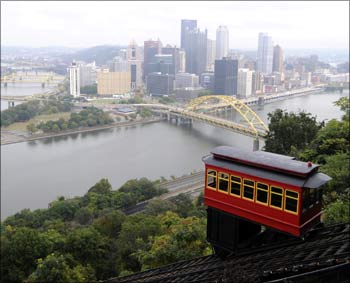|
| Help | |
| You are here: Rediff Home » India » Business » Report |
| Advertisement | |||||||||||||||||||||||
| |||||||||||||||||||||||
| |||||||||||||||||||||||
| Advertisement | |||||||||||||||||||||||
Climate change: West has a wrong image of India
 The United States is playing the perfect host, what with the third G-20 Summit being held in Pittsburgh, Pennsylvania. On Thursday evening, President Barrack Obama has invited leaders -- of the other 19 nations that form the G-20 along with the US -- for a working dinner at the Phipps Conservatory and Botanical Gardens.
The United States is playing the perfect host, what with the third G-20 Summit being held in Pittsburgh, Pennsylvania. On Thursday evening, President Barrack Obama has invited leaders -- of the other 19 nations that form the G-20 along with the US -- for a working dinner at the Phipps Conservatory and Botanical Gardens.
Phipps Conservatory is a beautiful greenhouse made from glass and steel. The structure is in the middle of Schenley Park. When Americans pick up an issue, they certainly go the whole hog..
The conservatory is a proud example of their 'green-building' practices, sustainable gardening and environment awareness. In Pittsburgh, residents are more enthused at talking about climate change than about 'reforms in financial arena' to get the global economy back on track.
A helpful local guide and history teacher told us that we might be asked to use laundry and air-conditioners sparingly.
*****
Not unexpectedly, the West -- particularly the US -- has a very wrong image of India and China on the issue of climate change.
Shyam Saran, Prime Minister Manmohan Singh's special envoy on climate change, who is in Pittsburgh, has declared several times why India cannot accept any legal or quantifiable limits to carbon emissions. There are many social issues in India, he had explained.
Moreover, a large number of people in India does not have access to energy, he said. Underdeveloped countries need to spend energy to develop. Any unfair restriction on carbon emissions will directly affect their development, he had argued.
Under the circumstances, it is also not possible to put curbs on fuel subsidies. India is ready to take steps to shift focus from fossil fuels to promotion of renewable sources of energy, Saran had said.
At the Pittsburgh G-20 Summit, financial issues are to be discussed and not much emphasis might be put on environmental issues. However, according to Saran, 'a strong political message from the G-20 leaders that they are committed to a comprehensive, balanced and equitable outcome at Copenhagen, would have a favourable impact on the negotiations.
G-20 alone cannot make decisions on climate change when the issue concerns all the countries, he added.
*****
Global financial recovery and growth are at the epicentre of the issues to be discussed at the Pittsburgh Summit, but so far as the Indo-US bilateral relations are concerned, the issues of nuclear proliferation and India's firm stand on climate change are gaining importance.
India has strongly rejected efforts to impose the Nuclear Non-Proliferation Treaty on it through a UN Security Council resolution. India has made it clear that it will not sign the pact as a non-weapon state.
On both these matters, India is not ready to accept 'externally prescribed norms or standards'.
At this juncture, nobody knows what would be the final outcome at the forthcoming Copenhagen Summit. China, India and other developing countries are not forming an informal union or even a joint strategy to checkmate moves by developed countries.
On Thursday, Saran categorically stated that India would not ask its citizens, who are living on basic necessities as far as energy consumption is concerned, to curtail carbon emissions.
On the negotiating table of climate change, India is not defensive, Saran said.
When asked if India is suffering from a bad image in the West, particularly in the US, Indian Ambassador to the US Meera Shankar said, "They are looking at the issue from their country's point of view."
"India will not let its carbon emission increase more than the West," she added.
India has been telling developed countries that climate change is not a bilateral issue, but a multilateral one. India can discuss climate change with the US or with other major economies but, "these deliberations can be helpful in promoting consensus at the negotiations," Saran said. "Substantive decisions can only emerge through the multilateral process, since that is where all the stakeholder are represented."
In the coming months, the prime minister's team will have major diplomatic challenges to face. On November 24, Indo-US bilateral meet will take place, followed by the Copenhagen Summit in December wherein world leaders would sit to decide what steps need to be taken to secure the planet from the ill effects of climate change.
In view of the issues of Nuclear Non-Proliferation Treaty, Comprehensive Nuclear Test Ban Treaty (CTBT) and Fissile Material Cut off Treaty gaining momentum at the G-20 plenary summit in Pittsburgh on Friday, India will save energy to focus sharply on the bilateral meet to take place in the White House in November.
Image: A view of downtown Pittsburgh from the Duquesne Incline on Mt. Washington.
Photograph: David A. DeNoma/Reuters
| © 2009 Rediff.com India Limited. All Rights Reserved. Disclaimer | Feedback |
